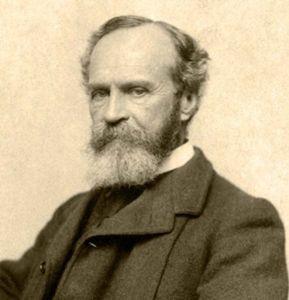
Pragmatism and Emotions
I want to finish this brief presentation by commenting a bit on the label that has been assigned to me as a “pragmatist.” I must confess that I am pragmatic. I believe that psychology should be useful in our daily lives. As a pragmatist, I focus on action: we know something is real and know of which it is composed, when we act upon it and notice what effect is observed. My colleague, John Dewey, at Columbia University in New York City, holds a similar view. My pragmatism and focus on action show up, for instance, in my ideas about emotions. I think that our emotions arise from our actions rather than the other way around. We are aroused, make decisions, act, and then experience emotions.
 If I am walking through the woods and confront a large bear, then I am immediately aroused physiologically, I begin to run away from the bear. While running away, I say to myself, in essence, I must be afraid because I am running away from the bear. I am not first afraid and then start running. I don’t have time to make an assessment about my feelings. If I took this time to reflect, then the bear might eat me for dinner. Rather, I am activated (aroused), make a rapid choice and take action. I run and then I assign an emotion. This is American pragmatism. This is an important perspective and a way to avoid being eaten by bears (especially here in the state you now call Maine – very beautiful but also very much a wilderness).
If I am walking through the woods and confront a large bear, then I am immediately aroused physiologically, I begin to run away from the bear. While running away, I say to myself, in essence, I must be afraid because I am running away from the bear. I am not first afraid and then start running. I don’t have time to make an assessment about my feelings. If I took this time to reflect, then the bear might eat me for dinner. Rather, I am activated (aroused), make a rapid choice and take action. I run and then I assign an emotion. This is American pragmatism. This is an important perspective and a way to avoid being eaten by bears (especially here in the state you now call Maine – very beautiful but also very much a wilderness).






